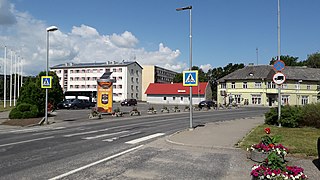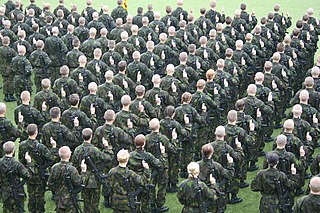Related Research Articles

Narva is a municipality and city in Estonia. It is located in the Ida-Viru County, at the eastern extreme point of Estonia, on the west bank of the Narva river which forms the Estonia–Russia international border. With 53,626 inhabitants Narva is Estonia's third largest city after capital Tallinn and Tartu.

Tapa is a town in Tapa Parish, Lääne-Viru County, Estonia, located at the junction of the country's Tallinn–Narva (west–east) and Tallinn–Tartu–Valga (north–south) railway lines. Tapa has the Estonian Defense Forces nearby Keskpolügoon. The Valgejõgi River passes Tapa on its northeastern side. Tapa has been known as both a railway and a military town throughout its history.

Lesbian, gay, bisexual, transgender, and queer (LGBTQ) rights in Estonia have advanced significantly over the course of the last few decades, especially since the turn of the 21st century. Among the countries which after World War II were controlled by the former Soviet Union, independent Estonia is now considered to be one of the most liberal when it comes to LGBTQ rights. There is a notable age gap, as younger people tend to be more tolerant and liberal, while older people tend to be more socially conservative.

Paldiski is a town and Baltic Sea port located on the Pakri Peninsula in northwestern Estonia. Originally established as a small Swedish port known as Rågervik, it evolved into an important ice-free port upon being incorporated into the Russian Empire in the 18th century.

Estonian Scout Association is the primary national Scouting organization of Estonia, became a member of the World Organization of the Scout Movement in 1996. The coeducational Eesti Skautide Ühing has 1,337 members as of 2011.

Leo Kunnas is an Estonian former military officer and a science fiction writer.

The Ministry of Defence of the Republic of Estonia and its head, the Minister of Defence, are responsible for organizing national defence. It is Estonia's ministry of defence. The mission of the Ministry of Defence is to deter attacks against Estonia and ensure that the country is capable of defending itself against external threats. Estonian national defence is based on initial self-defence capability as well as membership in NATO.

The Estonian Border Guard was the national security agency responsible for the border security of Estonia. It was subordinate to the Ministry of the Interior. The Border Guard also assisted with Search and Rescue missions. In 2010, the organization was superseded by the Police and Border Guard Board.

The Estonian Defence Forces is the unified military force of the Republic of Estonia. The Estonian Defence Forces consists of the Estonian Land Forces, the Estonian Navy, the Estonian Air Force, and the paramilitary Estonian Defence League. The national defence policy aims to guarantee the preservation of the independence and sovereignty of the state and maintain the integrity of its land area, territorial waters, airspace, and constitutional order. Its main goals remain the development and maintenance of a credible capability to defend the nation's vital interests and of the defence forces in a way that ensures their interoperability with the armed forces of NATO and European Union member states in order to participate in the full range of missions for these military alliances.

Björneborgarnas marsch is a Swedish military march from the 18th century. Today, it is mainly performed in Finland and Estonia and has served as the honorary march of the Finnish Defence Forces since 1918 and is the Estonian Defence Forces' official honorary march.

The Military Police Guard Battalion, or simply Guard Battalion is specialized unit under the Military Police of the Estonian Defence Forces, which conducts ceremonial duties and prepares military police units. It is based in Paldiski and specialized in urban warfare.

The Scouts Battalion is a battalion of the Estonian Land Forces. It is a part of the 1st Infantry Brigade and acts as its rapid response unit. The battalion is currently based at Tapa.

Riho Terras is an Estonian politician and a former military officer who is serving as a member of the European Parliament since 1 February 2020. He was the Commander of the Estonian Defence Forces from 2011 to 2018. He was promoted to general in 2017.

Military oath in the Finnish Defence Forces is taken by conscripts on a legal basis in the beginning of their military service. If the conscript is unwilling to take the oath, another option is to take the military affirmation. Before the conscript is to take the oath, he must be briefed on the rights and responsibilities of a soldier, as well as on the meaning of the oath. The oath is administered by the unit's commanding officer and in the presence of the unit's flag. The military oath used to be available only to members of the church, however, current legislation no longer makes such a distinction.

Riho Ühtegi is an Estonian major general. He has been the Commander of the Estonian Special Operations Force. Since 2019, he is the commander of the Estonian Defence League.
Hugo Jakob Kuusner was an Estonian jurist and politician.

The Summer War was the occupation of Estonia during the Second World War. It was fought between the Forest Brothers (Metsavennad), the Omakaitse, and the Wehrmacht's 18th Army against the forces of the 8th Army of the USSR and the NKVD.
An indirect election took place in Estonia on 30 and 31 August 2021 to elect the president of Estonia, who is the country's head of state. The Riigikogu — the Parliament of Estonia — elected Alar Karis to serve in the office and he was sworn in as the 6th president on 11 October 2021. The incumbent, Kersti Kaljulaid, was eligible to seek reelection to a second, and final, term but failed to gain the endorsement of at least 21 MPs, which is required in order for a candidate to register, as she was outspoken against some of the policies of the government, who thus denied her support.
References
- ↑ "Ligi 1000 ajateenijat lõpetasid sõduri baaskursuse ja annavad sõdurivande". Estonian Defence Forces . Retrieved December 18, 2023.
- ↑ "Lääne malevas algas sõdurioskuste baaskursus". Estonian Defence League . Retrieved December 18, 2023.
- ↑ "Galerii: Vahipataljoni noorsõdurid andsid sõdurivande". Postimees . Retrieved December 18, 2023.
- 1 2 3 "Military Service Act". Riigi Teataja . Retrieved December 18, 2023.
- ↑ https://dea.digar.ee/?a=d&d=AKriigiteataja19221114.2.3.1 Seadlus sõjaväe seadluste kogu VI raamatu § 6 lisa II, III ja IV muutmise kohta (RT 1922, 139)